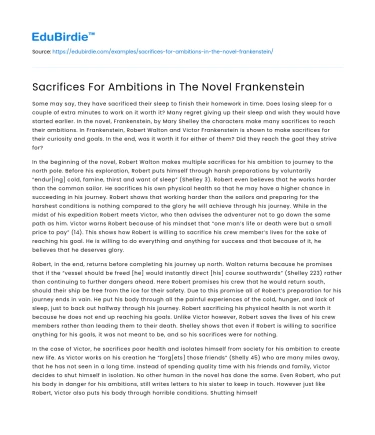Some may say, they have sacrificed their sleep to finish their homework in time. Does losing sleep for a couple of extra minutes to work on it worth it? Many regret giving up their sleep and wish they would have started earlier. In the novel, Frankenstein, by Mary Shelley the characters make many sacrifices to reach their ambitions. In Frankenstein, Robert Walton and Victor Frankenstein is shown to make sacrifices for their curiosity and goals. In the end, was it worth it for either of them? Did they reach the goal they strive for?
In the beginning of the novel, Robert Walton makes multiple sacrifices for his ambition to journey to the north pole. Before his exploration, Robert puts himself through harsh preparations by voluntarily “endur[ing] cold, famine, thirst and want of sleep” (Shelley 3). Robert even believes that he works harder than the common sailor. He sacrifices his own physical health so that he may have a higher chance in succeeding in his journey. Robert shows that working harder than the sailors and preparing for the harshest conditions is nothing compared to the glory he will achieve through his journey. While in the midst of his expedition Robert meets Victor, who then advises the adventurer not to go down the same path as him. Victor warns Robert because of his mindset that “one man’s life or death were but a small price to pay” (14). This shows how Robert is willing to sacrifice his crew member’s lives for the sake of reaching his goal. He is willing to do everything and anything for success and that because of it, he believes that he deserves glory.
Save your time!
We can take care of your essay
- Proper editing and formatting
- Free revision, title page, and bibliography
- Flexible prices and money-back guarantee
Robert, in the end, returns before completing his journey up north. Walton returns because he promises that if the “vessel should be freed [he] would instantly direct [his] course southwards” (Shelley 223) rather than continuing to further dangers ahead. Here Robert promises his crew that he would return south, should their ship be free from the ice for their safety. Due to this promise all of Robert’s preparation for his journey ends in vain. He put his body through all the painful experiences of the cold, hunger, and lack of sleep, just to back out halfway through his journey. Robert sacrificing his physical health is not worth it because he does not end up reaching his goals. Unlike Victor however, Robert saves the lives of his crew members rather than leading them to their death. Shelley shows that even if Robert is willing to sacrifice anything for his goals, it was not meant to be, and so his sacrifices were for nothing.
In the case of Victor, he sacrifices poor health and isolates himself from society for his ambition to create new life. As Victor works on his creation he “forg[ets] those friends” (Shelly 45) who are many miles away, that he has not seen in a long time. Instead of spending quality time with his friends and family, Victor decides to shut himself in isolation. No other human in the novel has done the same. Even Robert, who put his body in danger for his ambitions, still writes letters to his sister to keep in touch. However just like Robert, Victor also puts his body through horrible conditions. Shutting himself inside day and night, Victor forgets to take proper care of his health. As he finished his creation Victor is struck by a “fever which confined [him] for several months” (53). This was due to Victor not taking good care of his own health, which leads him to be bedridden. Just like Robert, Victor did not care for his own health to reach his ambition of creating new life. Shelley suggests that for Victor’s passions he is willing to shun his family as well as his health to become the creator of this new species.
Was it worth it for Victor to create the creature? He shortly deserts the creature right after it’s creation because of disgust, which then proceeds to kill his family. Victor abandons the creature because he believes that his creation “could not be so hideous as that wretch” (Shelley 49). All that Victor sacrifices for his creation ends up in vain. All the struggle he put his body through and the worrying of his family to just end up deserting the final result of his passions. Unlike Robert, Victor does reach his end result but the state his body is left with, traumatizes him away from the science he once loved. This is the first sign we see Victor regretting finishing his project. Once the creature first kills William, and indirectly Justine, Victor feels responsible for their deaths. He admits to himself that the “graves of William and Justine, [are] the first hapless victims” (84) of the creature he created. This is when Shelley clearly tells the reader that Victor regrets pursuing his passion in science because it led to the death of his family members. It is not worth it for Victor to make those sacrifices because he is not pleased with the result of his curiosity.
With all this in mind, just like Robert Walton and Victor Frankenstein, many people make sacrifices to make their dreams and ambitions come true. Sometimes, these sacrifices may be worth it and other times it may not be. Unfortunately for Robert and Victor, they do not get the results they want; additionally, they put at risk the people who are of value. No one should sacrifice more than they can afford to lose.






 Stuck on your essay?
Stuck on your essay?

